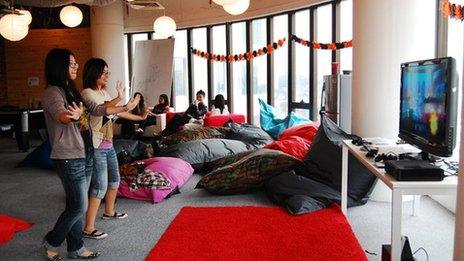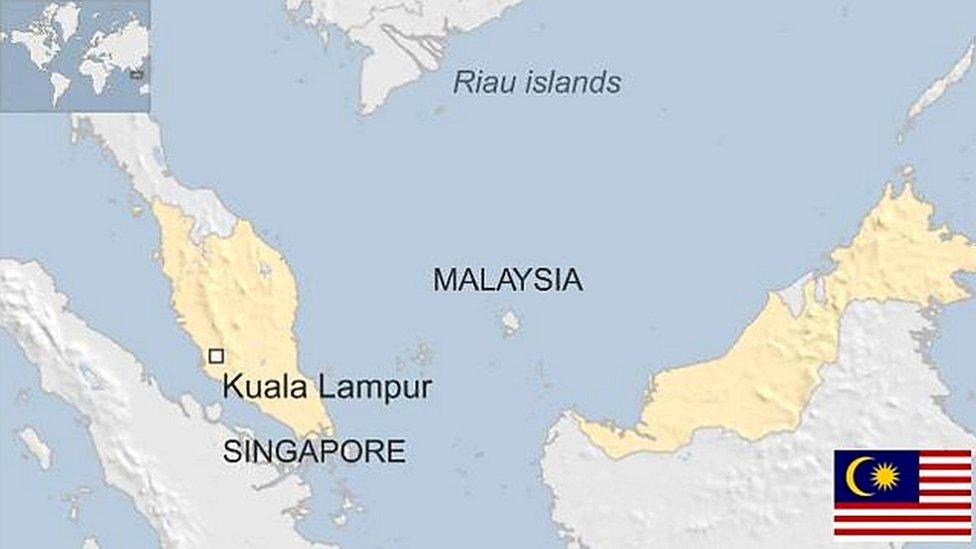Malaysia aims for hi-tech future
- Published

Replicating the success of Silicon Valley is about more than just looking and sounding the same
Entrepreneurs from Silicon Valley say all it takes is one success story to spawn a startup culture.
As such, Groupsmore may be Malaysia's poster child.
"We have a million subscribers and even my mom uses it," says Joel Neoh, the 28-year-old head of the Malaysian internet trading firm that was recently acquired by the US-based internet giant Groupon for an undisclosed amount.
The idea behind Groupsmore - or Groupon Malaysia as it is now called - is simple: buying in bulk yields better discounts.
Mr Neoh's company asks local businesses to offer discounts, sometimes up to 90%, in return for a certain guaranteed number of customers. The deals are activated once enough people agree to buy online.
"We've made Groupon a household name in Kuala Lumpur," says Mr Neoh.
GroupsMore's staff has grown from eight to 120 in about a year, and the growth is set to continue with plans in place to expand beyond Kuala Lumpur into states across Malaysia.

Attracting clever and creative staff is not easy, according to Groupon's Malaysian boss
"It's about building the ecosystem around people," says Mr Neoh, "not so much about building towers and good looking buildings and fast internet infrastructure.
'Quality people'
Groupsmore's success as a home-grown start-up company is deemed inspiring by the Malaysian government, so it is eager to replicate it as part of efforts to shift towards a knowledge-based economy.
But it may not be as easy as it looks, according to Mr Neoh.
During the company's early phase, before the Groupon acquisition, it was difficult to recruit the right people, he says.
"All of the smartest people I studied with were in the United Kingdom, the United States and Australia," he says.
"So the scene here is a lack of quality people."
Jawed Karim, the co-founder of YouTube, agrees that it may well be difficult to replicate Silicon Valley's success here in Malaysia.
"What makes Silicon Valley the innovation centre it is are the types of creative minds who set up there," he says.
"Without that pool of talent, it's hard to attract more.
"Even the United States has been unable to replicate a Silicon Valley outside of California."
Brain drain
In Malaysia's case, the problem appears to be brain drain caused by a controversial policy based on race, according to the World Bank.
Historically, Malaysians of Chinese and Indian descent have tended to be richer than the ethnic Malay-majority.

Malaysia is offering incentives for clever people to return from abroad
In an effort to address this, the government has prioritised Malays when allocating university scholarships and government contracts.
Opposition parties say this policy has made Chinese and Indian Malaysians feel like second class citizens, so many of them have left.
Some 300,000 highly educated, external ethnic minorities left Malaysia during the last decade, according to the World Bank.
Government reliance
Malaysia's government is now actively trying to recruit these people back by offering incentives such as tax breaks and long-term employment visas for foreign spouses.
They are also trying to retain talent by tailoring the training in universities to ensure employers get the kind of skills they need.
At the same time, the government has come up with various initiatives to fund and drive the hi-tech sector.
This might seem like a good initiative, but such reliance on the government is instead part of the problem, according to Low Huoi Seong of content provider Vision New Media.
"The government has been expected to do too much or government is expecting itself to do too much," he says.
Tomorrow's inventors
In spite of such gloom, Asia's potential is great, according to venture capitalist Saad Khan from Silicon Valley-based CMEA Capital.
Asia is already leading in gaming and virtual goods, so the next growth market will be the delivery of goods and services in a region where millions of people are just entering the middle class, he says.
"I don't think that innovation is going to come from the US," he says.
"I think it will come from places like here [in Asia] where you're up close and personal, where you know the people, where you know how to sell low cost cell phones, and where you know how to manufacture from that perspective.
"I know the next generation of success is not going to be in the [Silicon] Valley," he says.
- Published19 May 2023

- Published10 May 2018
- Published27 January 2016